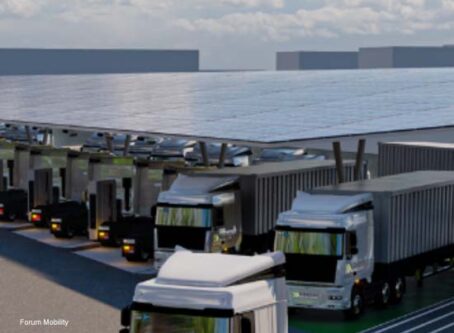New York City incentivizing businesses to move to overnight truck deliveries
In another attempt to reduce truck traffic during peak hours in the nation’s largest city, New York City officials are aiming to entice businesses to receive overnight truck deliveries.
The New York City Department of Transportation recently announced it will allocate $6 million to encourage businesses to participate in its Off-Hour Deliveries Incentives Program. The agency stated that reducing deliveries during the busiest part of the day will improve traffic safety, protect the environment and combat daytime congestion and double-parking.
The program will provide this financial incentive for businesses to shift deliveries to off-peak hours between 7 p.m. and 6 a.m. Funding comes from the U.S. Department of Transportation’s Congestion Mitigation and Air Quality program. Participating businesses will receive one-time payments to make overnight truck deliveries feasible. Approved purposes of the funding include:
- Installing low-noise equipment for delivery vehicles (e.g., newer hand pallet trucks and backup alarms)
- Building security retrofits to enable unattended deliveries
- Installing safety equipment such as security cameras
Virtual information sessions about the initiative will be available to businesses in June. To register for the session at 11 a.m. Eastern June 3, click here. To register for the session at 5 p.m. Eastern June 10, click here.
“Ninety percent of everything in our city – our food and drink, our clothing and paper towels – comes in by truck. To decrease congestion on the roads, we have to get a handle on our deliveries,” Deputy Mayor for Operations Meera Joshi said in a statement. “While we work to route deliveries into lower-emissions vehicles, we can make immediate inroads by spreading them out across the day if we can encourage businesses to be open to pick them up. This program will go a long way towards helping businesses help our city, decreasing emissions, improving our air quality and keeping our thoroughfares moving. This is a real win for New York.”
Joshi was the Federal Motor Carrier Safety Administration’s acting administrator in 2021, taking over administrator duties that January. Her time in the role was short-lived after she was announced as New York City’s deputy mayor for operations that December.
New York City’s Off-Hour Deliveries Incentives Program is nothing new.
Initially a pilot program, it became permanent in 2010. Since then, NYC DOT has enrolled 27 businesses with around 1,120 locations receiving overnight truck deliveries. The agency has a goal of reaching 5,000 locations by 2040, which could keep 62,000 trucks away from the city during peak hours.
Although the initiative was designed to help small businesses afford the shift to overnight truck deliveries, large businesses also participate, including Just Salad, Anheuser Busch-Inbev, Wegmans, Odeko and Whole Foods Market.
In addition to the recently announced $6 million in funding, the program anticipates receiving another $5 million from New York City’s upcoming congestion pricing plan. Scheduled to begin on June 30, the controversial plan is facing several federal lawsuits. Truckers entering New York City’s central business district between 5 a.m. and 9 p.m. will have to pay as much as $54 each time. Overnight rates will be reduced by 75%.
Trucks not wanted in the Big Apple
New York City has taken several measures to reduce the number of trucks on its streets.
In April, the city launched the LockerNYC pilot program to reduce both package thefts and delivery truck trips. The year-long pilot program lets New Yorkers receive and send packages via secure lockers on public sidewalks, allowing delivery trucks to make fewer stops.
In March, NYC DOT authorized the use of e-cargo bikes on city streets and established safety standards for those vehicles. Officials hope companies will shift deliveries to e-cargo bikes in lieu of larger trucks.
New York City also is working on two more pilot programs that will move trucks away from the city.
The Blue Highway program will look into using the city’s marine facilities for freight. Still in the planning stages, the program will move last-mile deliveries away from trucks by using the waterfront instead.
The city also is launching a pilot program that creates microhubs. Up to 20 curbside or off-street local delivery hubs will serve as locations for larger diesel trucks to unload cargo onto smaller, cleaner vehicles for last-mile deliveries. LL









